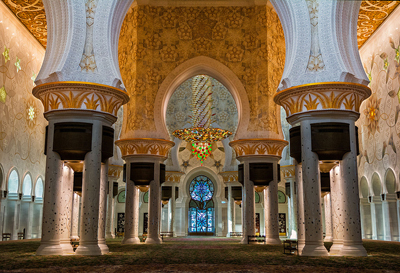By SACHI LEITH

I didn’t tell anyone at work that I was fasting for Ramadan. Unsure how my Muslim friends would react to an amateur appropriation of their religious culture, I found the explanation difficult.
“Why?” A friend—American, like me—asked the obvious question.
I stumbled through my rudimentary understanding of the Qur’an, the fact that I was trying to focus on more than immediate bodily needs, to purify my mind, et cetera. I explained that I wanted to understand my friends better, those who chose to practice.
Earlier, I had struggled to explain to an Emirati friend that I’m not really Christian.
“See, my dad was sort of… culturally Christian,” I told her. “But we don’t go to church every Sunday.”
We never went to church. Except for one Sunday school session mandated by my grandparents, my sister and I aren’t culturally anything more than Christmas Tree Christian. Growing up, I always thought I might like to be Jewish, envious of my best friend for the Yiddish words her parents sometimes spoke and the sprawling family dinners they had for Passover Seder, rituals of matzoh and storytelling. Come December, I gazed longingly at their tarnished menorah, its dripping candlewax infinitely more beautiful than my family’s multicolored lights and battery-operated Dancing Santa. I won’t convert to the scriptural side of anything on the whim of religious allure, but I’ve always craved the richness of religion-as-culture.
In Abu Dhabi, religion-as-culture is inescapable. After two years here, the call to prayer is my unofficial alarm clock, though I respond only by acknowledging its beauty. I love the Sheikh Zayed Grand Mosque, the country’s magnum opus of marble and ceremonial worship; its milky white domes and spindling minarets have—in the right light—taken my breath away.
From my bedroom window I have a clear view of the Ganem Bin Hamooda Mosque, nowhere near as opulent. It’s a vaguely Mamluk styled, toffee-striped structure where, as I watch, people gather in preparation for maghrib prayer, the sundown end to the first day of Ramadan. Like the worshippers, I have refrained from food and water since the 4 a.m. fajr, but instead of joining the crowds, I perch at the window, watching voyeuristically for the imam to begin and the iftar tent to swell for the post-prayer meal. A faint music sounds in the distance.
“Is that it?” I ask, eyes trained on the crowds below. My roommate shrugs from across the room. Another call begins, closer. I can hear the words clearly now, beginning with a chorus of allahu akbar’s.
Instead of the leap towards the water bottle as I’d anticipated, it’s more of a slow walk to the kitchen, where my hand shakes as I pour a glass of water and reach for the box of dates. My body’s physical relief at the rush of energy from the thick fruit on my tongue makes this feel less like a farce. I’m not part of the crowd, but I, too, have made the communal sacrifice, and I, too, thank God for this feeling.
This is the explanation about fasting I have admitted only to myself: I want to belong. Everyone’s doing it. Two years into my life in Abu Dhabi and I don’t think I’ll ever truly understand the place. In lieu of true belonging, I shrug on its customs like a thick shawl. Later, I’ll take iftar with friends who gladly share their culture, giving showy congratulations for my voluntary hunger. But on this first day, I fast to blend in—to be just another Abu Dhabian waiting for maghrib.
After midnight, I sit outside my apartment building with a cup of coffee. I’m quickly becoming nocturnal. It leaves less time for daytime hunger; more at night for water and attempted spirituality. In most other places, you’d people-watch facing the street, but here I sit turned in to the block. My 45-story high rise shelters and shades a plot of older, shorter settlements: juice shops, tailors, typing services. People walk freely, uneven sidewalks be damned, crisscrossing side streets and parking lots.
While a few hours ago, the streets were teeming, now it’s just the stragglers and a late night deliveryman, lit by the green lights of Ganem bin Hamooda. The air is less oppressive at night, and the ledge outside the high rise is my front porch—nobody looks twice at me, elbows on knees, cupping my mug in my hands, a constant voyeur. That I can watch like this, without being watched myself, is a triumph. It’s as though I pray behind the partition, in a special section of my own. Worshippers don’t notice me, modestly veiled behind my coffee cup, but an old woman turns silently to smile and hand me a bag of sweets.
Sachi Leith is a Vermont native currently studying history and literature at NYU Abu Dhabi, where she edits the literary magazine Airport Road.




